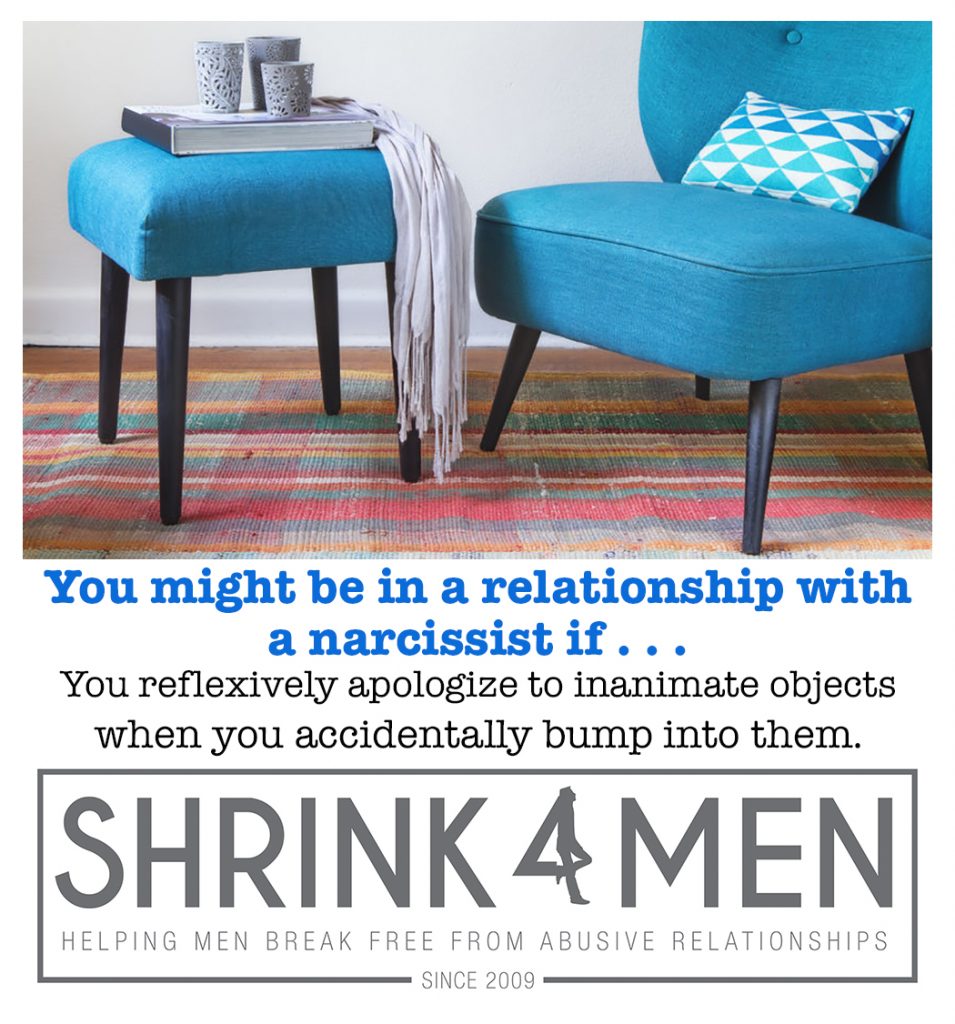 If you’ve been in a relationship with a narcissist or other abusive personality, you’ve probably become conditioned to preface many of your spoken and written statements with, “I’m sorry.”
If you’ve been in a relationship with a narcissist or other abusive personality, you’ve probably become conditioned to preface many of your spoken and written statements with, “I’m sorry.”
I’m sorry to bother you.
I’m sorry I have feelings and needs.
I’m sorry you had to cheat on me.
I’m sorry I can’t read your mind.
I’m sorry I ruined your life.
I’m sorry I got blood on your sleeve when you hit me.
I’m sorry I made you behave badly.
I’m sorry for breathing too loudly.
I’m sorry for taking too much room on the bed (as your ass hangs over the edge of the mattress.)
I’M SORRY.
A fundamental diagnostic criteria of the Cluster B disorders (i.e., narcissists, borderlines, histrionics, sociopaths/psychopaths) is a lifelong pattern of blaming others for their problems — particularly the self-created ones — and a refusal to hold themselves accountable. Oftentimes, their partners, children, employees, etc., will learn to reflexively take the blame and apologize in an effort to avoid or minimize the tantrums, rages, pout outs and silent treatments. This typically ends up backfiring on you, however.
First, no one respects an eggshell tiptoeing, people pleasing doormat. Second, when you apologize for and cop to things you didn’t do or take the blame for the narcissist’s or borderline’s bad behavior, you only set yourself up for more blame and abuse later on. Your admissions and apologies will be used against you in the future as evidence that it’s all your fault. Third, each time you apologize to your abuser for essentially tolerating and enabling their abuse of you, it further erodes your self-worth and self-respect. Fourth, you show yourself to be an easy target to other predators. Apologize if you’ve actually done something wrong.
Do you find yourself apologizing for things that aren’t your fault or things that there’s no reason to apologize for — like bumping into a table or asking another cafe patron if they’re done with the newspaper? Do you apologize for asking questions or before stating opinions? Do you apologize for having reasonable expectations of others? Or, something I see quite often in my practice, apologizing to your therapist for expressing emotions like anger or sadness (i.e., crying) in session? If so, this is a learned behavior that you can change.
An abuse victim doesn’t just take on their abuser’s problems. You also carry your abuser’s guilt and shame for them. You can stop doing that. Heighten your self-awareness and try to catch yourself before or as you’re about to apologize for breathing oxygen and taking up space. Ask yourself, “What am I apologizing for? Have I done anything wrong? Or, is this a residual artifact of being in an abusive relationship?” Then straighten your spine, smile and confidently say, “Please pass the salt” without apologizing!
(LINK to the Facebook post. LINK to the Twitter post.)
 Counseling with Dr. Tara J. Palmatier, PsyD
Counseling with Dr. Tara J. Palmatier, PsyD
Dr. Tara J. Palmatier, PsyD helps individuals work through their relationship and codependency issues via telephone or Skype. She specializes in helping men and women trying to break free of an abusive relationship, cope with the stress of an abusive relationship or heal from an abusive relationship. Coaching individuals through high-conflict divorce and custody cases is also an area of expertise. She combines practical advice, emotional support and goal-oriented outcomes. Please visit the Schedule a Session page for more information.
 Want to Say Goodbye to Crazy? Buy it HERE.
Want to Say Goodbye to Crazy? Buy it HERE.